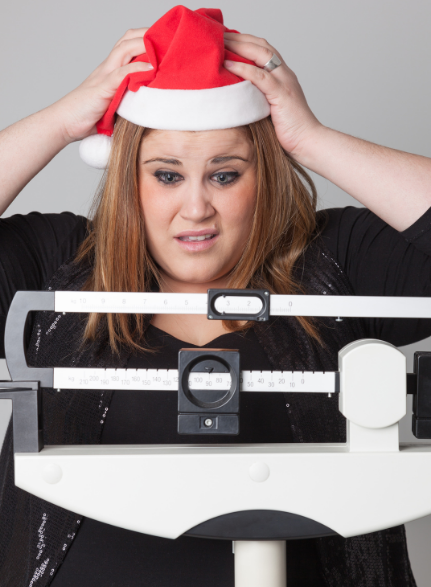Every year it happens. The lights go up… the cookies come out… the gatherings begin… And by January, most people step on the scale and discover they’ve gained anywhere from 3 to 7 pounds during the holiday season.

But here’s the thing no one talks about:
It’s not just the treats. It’s not just the mashed potatoes, the eggnog, or the holiday chocolates your coworker keeps leaving in the break room.
Holiday weight gain happens because the entire season triggers biological changes in your body:
❌ Your stress goes up.
❌ Your sleep goes down.
❌ Your routine gets chaotic.
❌ Your blood sugar swings harder.
❌ Your cravings get louder.
❌ Your metabolism slows down.
Put all that together, and your body is basically saying: “Store fat now — figure it out later.”
But you can get ahead of it. When you understand why holiday weight gain really happens, you can support your metabolism, keep your energy stable, and enjoy the season without feeling like you’re fighting your own biology.
This blog is going to teach you how.
Let’s start with the 7 biggest reasons people gain weight over the holidays. Then we’ll get into how to give your metabolism the support it needs to stay strong all season long.
1. Holiday Foods Spike Your Blood Sugar
From gingerbread to mashed potatoes to peppermint hot chocolate… the holidays are a carb-lover’s dream. But for your metabolism? Not so much.
Most classic holiday dishes are packed with simple sugars and fast-digesting carbs — the kind that send your blood sugar soaring.
When your blood sugar spikes, your body releases insulin, a hormone whose main job is to shuttle sugar out of your bloodstream and into your cells. But here’s the tricky part:
✔️ The more often your blood sugar spikes…
✔️ The more insulin your body releases…
✔️ The more your body shifts into fat-storage mode.
And during the holidays, those spikes happen constantly:
- Dessert after dinner
- Holiday drinks
- Party appetizers
- Midday snacks at work
- Bigger-than-usual meals
You’re not doing anything “wrong” — it’s simply the season.
But repeated glucose spikes not only slow your metabolism… they also lead to:
- Afternoon energy crashes
- Stronger sugar cravings
- More belly fat storage
- A sluggish, “heavy” feeling
This is one of the biggest reasons holiday weight gain feels like it sneaks up on people. Your metabolism isn’t “broken” — it’s just overwhelmed.
2. Stress Hormones Are Higher This Time of Year

The holidays are joyful — but they’re also stressful. Travel, family dynamics, end-of-year deadlines, gift shopping, crowded stores, planning, hosting… it all adds up.
And when stress rises, your body releases more cortisol, your primary stress hormone.
Here’s why that matters:
Cortisol directly affects your weight.
When cortisol stays elevated, it triggers:
- Stronger cravings (especially for sugar and comfort carbs)
- Increased appetite
- Slower fat-burning
- More fat storage around the belly
- Lower motivation and energy
In other words… Your brain gets wired to want more food, hold onto more fat, and feel less energized — the perfect recipe for holiday weight gain.
And it’s not your fault. Your body is simply responding to stress the way it’s designed to — by protecting you.
The challenge is that holiday stress isn’t a one-time event… It’s weeks of elevated cortisol.
This constant hormonal pressure makes your metabolism sluggish and your cravings louder, even if you’re doing your best to stay balanced.
3. You Sleep Less (and Poorer)
If there’s one thing that drops every holiday season, it’s sleep.
Late-night gatherings… travel… irregular schedules… stress… rich food… all of it adds up to fewer hours and lower-quality rest.
But here’s the important part:
Poor sleep disrupts your hunger and metabolism hormones.
When you don’t sleep well, two specific hormones get thrown completely out of balance:
- Ghrelin (your “hunger” hormone) goes up
- Leptin (your “I’m full” hormone) goes down
This creates the perfect storm: Your appetite increases — but your ability to feel full decreases.
Suddenly you want more food, especially sugar and carbs, and you’re less satisfied after eating them.
And if that wasn’t enough…
Sleep deprivation slows your metabolic rate.
Studies show that even one night of poor sleep can reduce the number of calories you burn the next day.
Now imagine that happening several nights in a row — or all season long.
It’s no surprise most people feel heavier, hungrier, and more sluggish by December. Your body is simply trying to compensate for the sleep it’s missing.
The good news? Supporting your metabolism during this season helps counteract these hormonal swings — but more on that near the end of this blog.
4. You Move Less in Colder Weather

When temperatures drop, so does your daily movement. Walks outside turn into evenings on the couch… Quick errands replace long outings… And cozy blankets suddenly look way more appealing than workouts.
Even if you don’t notice a huge change, your body does.
Here’s why:
Movement is one of the biggest drivers of metabolism.
When you move — even lightly — your body:
- Burns more calories
- Improves blood sugar regulation
- Activates fat-burning enzymes
- Supports muscle mass (which raises metabolism)
- Boosts circulation and energy levels
But in winter?
Those small bursts of movement disappear:
✔️ Fewer steps
✔️ More time indoors
✔️ More sitting
✔️ Less sunlight (which affects energy and motivation)
And the less you move, the slower your metabolism becomes. Not dramatically at first — but enough to make holiday foods store more easily as fat.
Even a drop as small as 1,000–2,000 steps a day can shift your body into “energy conservation mode.”
It’s not laziness — it’s just the season.
Holiday schedules + cold weather + shorter days = naturally lower movement → naturally slower metabolism.
The key is giving your metabolism a little extra support so it stays responsive, even when your routine changes.
5. Holiday Meals Are Higher in Fat, Salt, and Sugar
Let’s be honest… holiday food hits different. It’s richer, sweeter, saltier, and far more comforting than the meals we eat the rest of the year.
And that’s not a bad thing — these foods are tied to tradition, family, and joy. But they also have a powerful effect on your brain and metabolism.
Holiday meals are engineered (accidentally!) to make you overeat.
Foods high in sugar, fat, and salt activate the brain’s dopamine reward system, the same system tied to cravings and motivation.
This creates a loop that looks like this:
- You eat a delicious holiday dish
- Your brain releases dopamine (“that was amazing!”)
- Your brain says: “Do that again.”
- You go back for more — even if you’re not hungry
This isn’t a lack of willpower. It’s just biology.
Plus…
Richer meals require more metabolic effort.
High-fat + high-sugar meals slow digestion and increase post-meal fatigue. Salt causes water retention. Extra calories get stored more easily when metabolism is already stressed.
And when these meals show up every week — or every day — throughout the season, they create a steady environment where your body is primed to store more and burn less.
Again, it’s not your fault. Your brain and metabolism are simply responding to food designed to be irresistible.
But a supported metabolism is more resilient — it handles these occasional indulgences without spiraling into more cravings, more sluggishness, and more weight gain.
7. Your Metabolism Naturally Slows Under Stress + Inconsistent Routine

This one surprises most people, but it’s actually one of the biggest drivers of holiday weight gain.
Even if you don’t eat a ton of extra calories… Even if you try to stay active… Even if you think you’re doing everything “right”…
Your metabolism can still slow down simply because your routine changes.
During the holidays:
- Meals happen at inconsistent times
- You stay up later
- You eat larger portions
- You snack more frequently
- Your stress levels fluctuate
- You skip normal habits (exercise, hydration, meal prep, etc.)
- You travel or host — both disrupt your body’s rhythm
All of this impacts something called metabolic flexibility — your body’s ability to switch smoothly between burning carbs and burning fat.
When your routine is unpredictable, your metabolism becomes less efficient. It stops switching easily… and starts conserving.
This means:
- You burn fewer calories at rest
- You store more from each meal
- You rely more on cravings for energy
- Your appetite signals become less accurate
It’s not “holiday weight gain”… It’s metabolism slowdown triggered by stress + inconsistency.
And since the holiday season lasts several weeks, these changes compound — which is why so many people feel noticeably heavier or more sluggish by January.
The good news?
Once your metabolism is supported and stabilized, it becomes much more resilient — even when life gets chaotic.
Which brings us to the final (and most helpful) section…
Why Metabolism Matters More Than Willpower
Here’s the truth that needs to be shouted from every rooftop during the holidays:
Your holiday weight changes do NOT just come down to willpower. It comes down to biology.
Because the things that influence how much you eat — and how much you store — are mostly outside conscious control:
- Hunger hormones
- Fullness hormones
- Cravings
- Stress responses
- Blood sugar balance
- Sleep quality
- Muscle activity
- Metabolic flexibility
- Inflammation levels
➡️ You don’t “choose” to be hungrier when you’re tired.
➡️ You don’t “choose” to crave sugar when your blood sugar crashes.
➡️ You don’t “choose” to store fat when your cortisol spikes.
➡️ You don’t “choose” to feel sluggish when your metabolism slows.
These are built-in survival responses that date back thousands of years.
So if your body feels out of control during the holidays, you’re not failing — your biology is just overwhelmed.
That’s why the solution isn’t dieting harder or fighting cravings with willpower. The solution is supporting the systems that regulate:
- Metabolism
- Appetite
- Stress
- Inflammation
- Energy
When these are balanced, your body naturally shifts into a healthier rhythm:
✓ Cravings decrease
✓ Blood sugar stabilizes
✓ Energy becomes steadier
✓ Your metabolism stays responsive
✓ Fat burning becomes easier
✓ You feel more in control
And that’s exactly where Metabolic Pearls come in.
They’re not a “fat burner.” They’re not a stimulant. They’re not a crash diet.
They’re metabolism support at the biological level.
And with the holiday season approaching, supporting your metabolism is the smartest thing you can do — not to restrict, but to stabilize.
How Metabolic Pearls Can Help You Stay Balanced This Holiday Season

With everything working against your metabolism during the holidays — stress, sugar, late nights, travel, inconsistent routines — your body isn’t looking for restriction…
…it’s looking for support.
That’s where SomaLeaf Metabolic Pearls come in.
Metabolic Pearls use a unique blend of full-spectrum cannabinoids and plant-based compounds that help your metabolism stay calm, steady, and responsive — even when your holiday schedule isn’t.
Here’s how they help:
1. They Support a Calm, Balanced Stress Response
The cannabinoids in Metabolic Pearls work with your endocannabinoid system (ECS) — the network in your body that regulates stress, mood, appetite, and metabolism. A calmer nervous system =
- lower cortisol
- fewer stress cravings
- less emotional eating
- a faster, steadier metabolism
2. They Help Reduce Inflammation (a HUGE factor in weight gain)
Chronic inflammation slows metabolic rate and disrupts appetite signals. Full-spectrum cannabinoids have been shown to support:
- healthier inflammation levels
- smoother digestion
- easier fat metabolism
- better energy flows throughout the day
3. They Support Healthier Blood Sugar Fluctuations
When your blood sugar is steadier, your cravings quiet down. You experience:
- fewer energy crashes
- better appetite control
- more balanced hunger rather than sudden spikes
This is crucial during a season filled with sugary foods, rich meals, and irregular eating times.
4. They Help Your Body Maintain Metabolic Flexibility
Your metabolism needs to switch back and forth between burning carbs and burning fat. Holiday chaos interferes with this.
Metabolic Pearls support your ECS — one of the key regulators of energy balance — helping your body stay flexible, stable, and more efficient.
5. They Make You Feel More “In Control” — Naturally
No jittery stimulants. No crash. No fake energy boost. Just smoother digestion, calmer cravings, and more balanced energy — the foundation of a stable metabolism.
Why this matters right now
The holiday season creates the perfect storm for weight gain. But when your metabolism is supported from the inside out, your body handles the season without spiraling into cravings, overeating, or post-holiday regret.
This makes Metabolic Pearls the perfect companion for anyone who wants to enjoy the holidays — while still feeling light, energized, and in control.
You Can Enjoy the Holidays and Stay On Track
Let’s be clear: The holidays are meant to be enjoyed — not restricted.
You deserve the warm meals… the celebrations… the desserts… the second helpings… the cozy nights in. All of it.
And you can enjoy those things without sabotaging your health or feeling like you’re starting over in January.
Because holiday weight gain isn’t about “eating perfectly.” It’s about giving your metabolism the support it needs when the season becomes more stressful, more indulgent, and more unpredictable.
That’s exactly why we created Metabolic Pearls — to help your metabolism stay steady, responsive, and balanced during the busiest (and most tempting) time of the year.
The cannabinoids inside work with your body’s natural regulatory systems — helping reduce inflammation, calm cravings, balance appetite cues, and support smooth metabolic function from the inside out.
So this year? Instead of fighting your biology… You get to work with it.
✨ Feel lighter.
✨ Stay in control.
✨ Enjoy the holidays fully — without the metabolic crash afterward.





